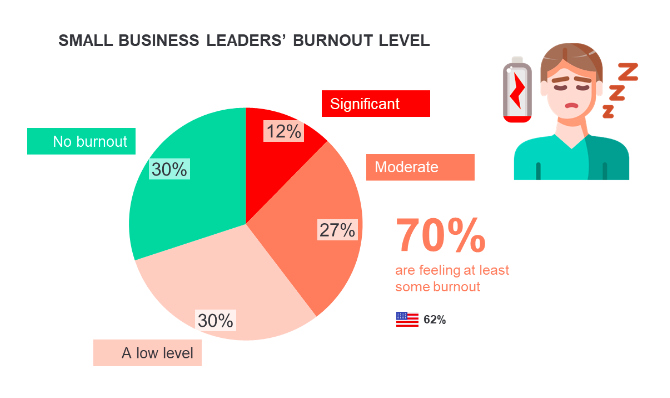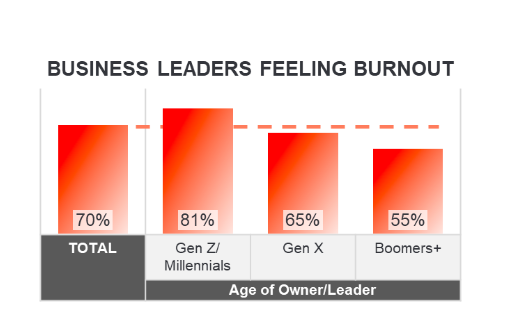Brief • 4 min Read

Small Business owners and leaders are often Jacks and Jills of all trades; they’re the strategists, product designers, salespeople, customer service providers, accountants, cashiers, delivery drivers, and cleaning staff of their businesses.

So considering everything on their plates, perhaps it is no surprise that many Small Business leaders report they are experiencing burnout as they navigate their various responsibilities and challenges. The good news is that just one-in-eight (12%) say they are feeling significant burnout, however fully seven-in-ten (70%) are experiencing at least some burnout at the current time.

Burnout Is Particularly Impacting Younger Business Leaders
Younger business leaders are feeling particularly burned out; more than eight-in-ten Gen Z/Millennial leaders (81%) report feeling some level of burnout, vs. 65% of Gen X and 55% of Boomer+ small business leaders. This higher level of burnout among younger business leaders comes as these leaders report higher growth levels, a greater number of business challenges, higher levels of innovation and evolution… and just generally more stuff going on, vs. older business leaders.

The Most Common Step Being Taken? Just Work Through It; one-in-five are passing up new business
Among those who are feeling burnout, the most common step being taken (identified by 42%) is to simply just try to work through our workload to get ahead. Rounding out the top five most common steps being taken to deal with burnout are taking more vacation (26%), investing in tech to improve productivity/efficiency (23%), passing up potential new business (21%), and offloading work to contractors or external parties (19%).

Conclusion
While hard to quantify, burnout – feelings of being overworked, lonely, stressed, underenthused, etc. – is likely one of the top barriers to increased growth and accelerated business success. Small Business leaders who are able to find the right balance are most likely to succeed, and suppliers who are able to make life easier and less stressful for Small Business leaders are most likely to become true long-term partners.
Subscribe for more Insights
Subscribe to our newsletter for the latest trends in business, politics, culture, and more.
Subscribe for more Insights
Subscribe to our newsletter for the latest trends in business, politics, culture, and more.
Related Content








